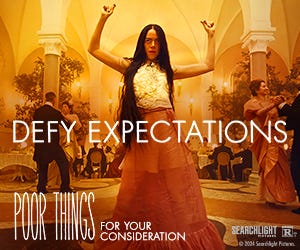Field Guide #3: Agents
Working with a visionary or nebbish? A monster or mensch? How to get representation, not opposition
This is third in my Field Guide series this week. I earlier wrote about Actors and Writers.
More than any other figure, agents have become the face of contemporary Hollywood. Or at least the caricature of it.
In an industry driven by ruthless dealmaking, they are painted as the dealmakers par excellence. In the Ari Gold version, they are the Svengalis who bend the industry to their will, blazing a trail for their hapless clients.
There is a reason they are the source of almost everything you read in the trades. They are transactional, in the non-pejorative sense of the word — as in, agents sit at the center of every deal, of almost every conversation that happens in Hollywood. The image that all those placements creates is one of superagents manipulating mere studio owners to do their bidding, and with a wave of their fingers, opening the doors to immortality for their clients.
When there’s a deal to be done, an agent will materialize, deservedly or not. The vast, vast majority of deals done in this business have an agent involved.
Which is to say, the rules we’ll look for are slightly different on this round. It’s not so much a question of getting the most out of your agent as it is finding the agent that’s right for you and making sure your agent is aligned with your needs. Great agents are responsible for some of the biggest things to happen in Hollywood; useless agents are drags on clients and projects, slowing everything down or only showing up for the deal signings and to collect their cut. If you’re a producer or executive, you need to figure out if this is an agent who can get your deal done, or one you’re going to have to work around.
Here then, as we continue our Field Guide to the professions of modern Hollywood, is the one question you have to answer: Which kind of agent/agency are you dealing with, either as a client, potential client or someone negotiating on the other side of the table? Here are five key questions to ask yourself and three pieces of advice for clients/execs to make the most of your agent:
1. Who Do You Want Representing You?
Every agent has a different negotiating style, and let’s define the parameters of this spectrum as ranging from asshole to nebbish. The paradox of agenting is that few of us would want to be repped by someone with a reputation for being the nicest guy in town, but you don’t want to be fronted by Dr. Mengele either.
I’ve asked around about the negotiating styles of some of the different agency bosses. Here are the various responses.
You can guess which goes with whom:
“Terrifying. You have no idea where you stand and no idea if he’s about to turn on you.”
“Plays a monster but it’s all part of the role. One minute you’re screaming at each other, the next minute you’re laughing.”
“Incredibly prepared and incredibly helpful. Comes into the dealmaking with a perspective on how to make it a win for everybody. A delight to deal with.”
“A true asshole. Nasty and unhelpful.”
“Gets it done. Not a lot of vision, but not a lot of problems either.”
Which style of negotiator are you dealing with? Which one are you comfortable representing you (or at least guiding his agency’s culture)?
2. Big Fish or Hard-Charging Minnow?
You’ve got your first break and suddenly Hollywood comes flocking. First choice: Do you go with a big agent with a big list who will presumably give you access to the big projects but might not have a lot of time for you?






